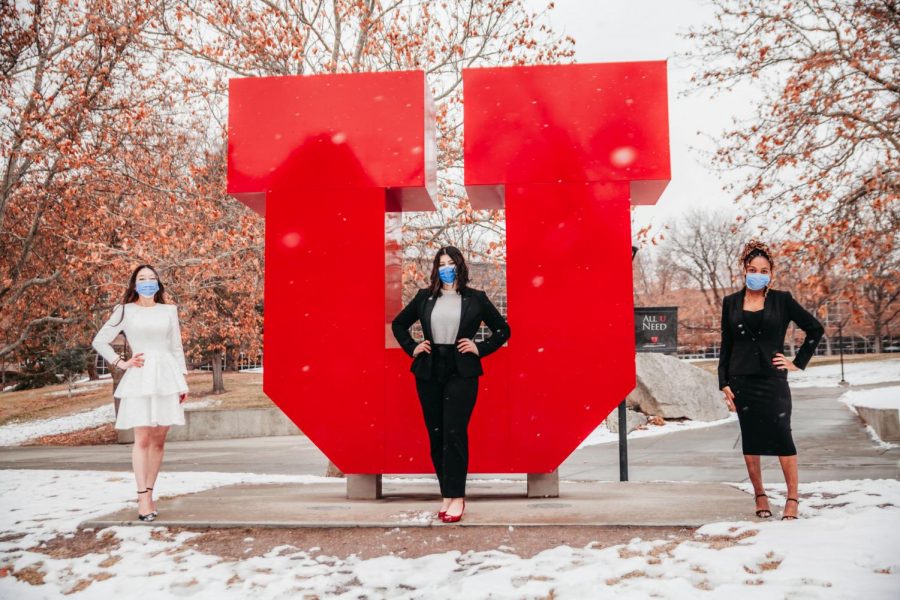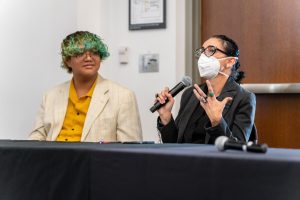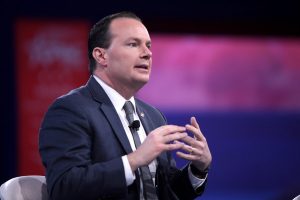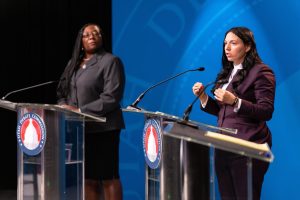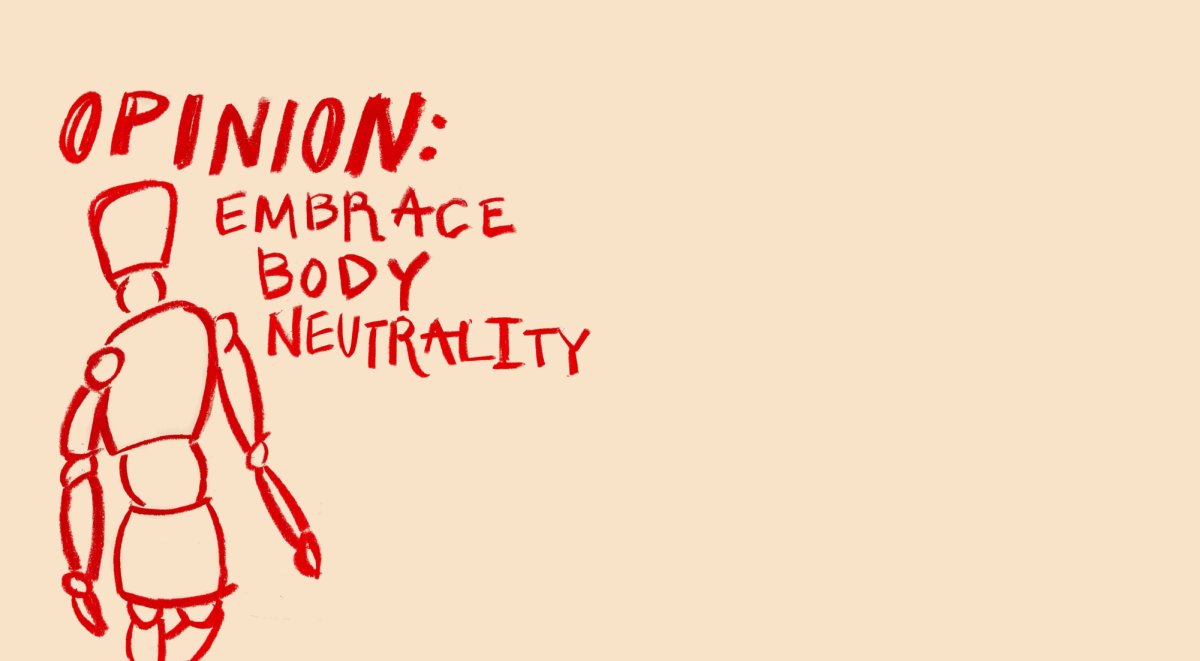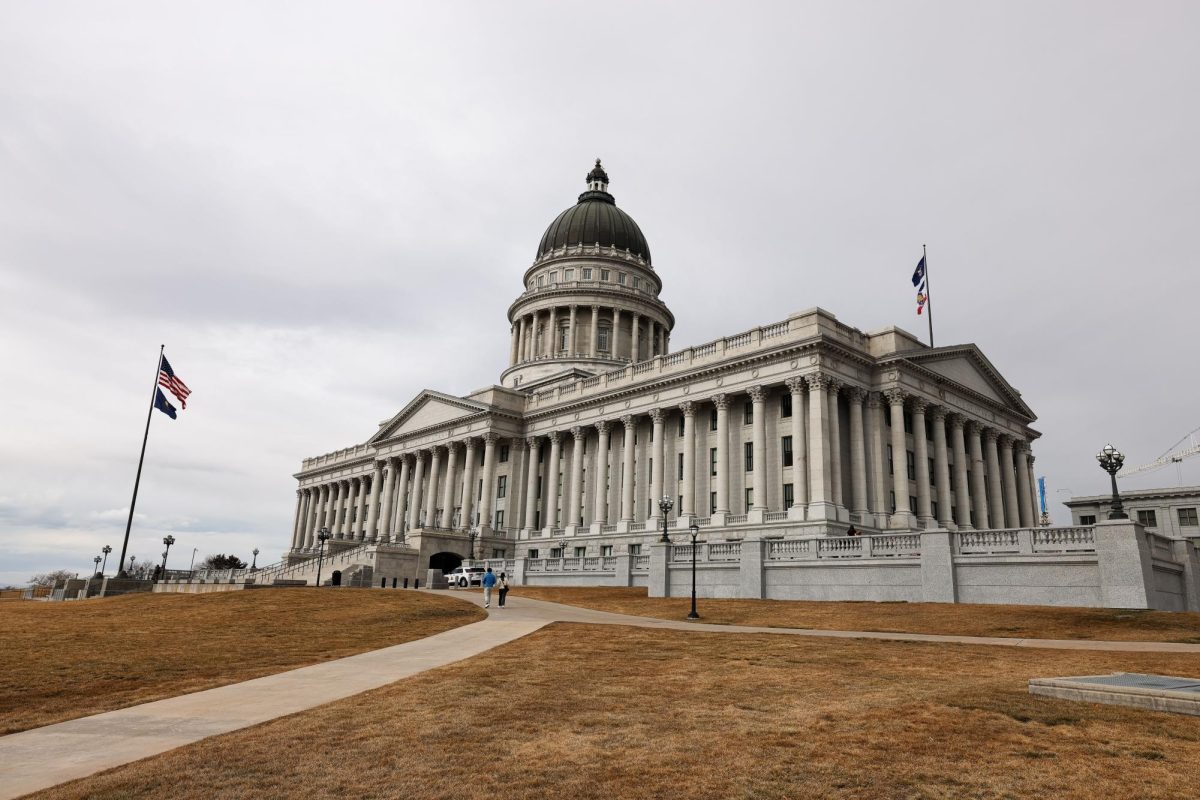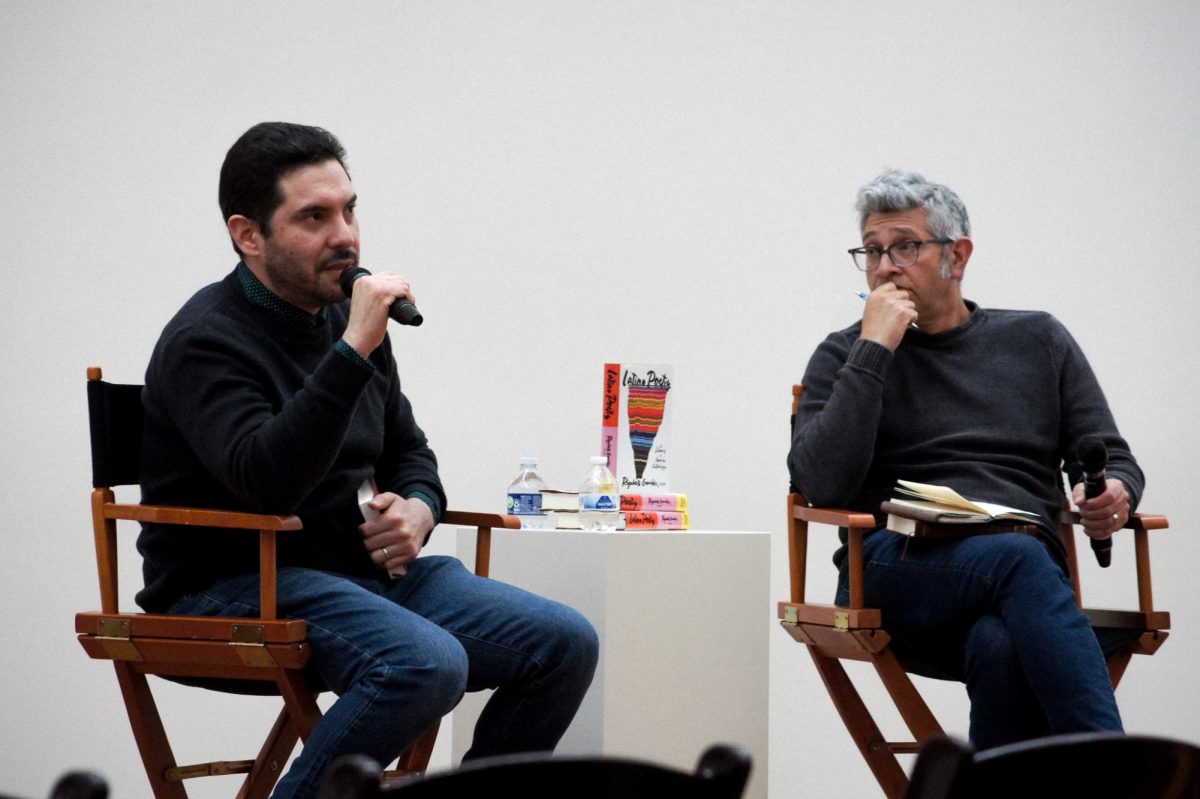Past ASUU Administration Members Say Student Government Needs Restructuring on Every Level
Tiffany Chan (left), Jess Wojciechowski (middle), Maryan Shale (right). (Photo courtesy of Wojciechowski ticket)
October 21, 2022
When Jess Wojciechowski, the 2021-22 University of Utah student body president, met with the board of trustees to vote on the U’s proposed tuition increase on March 24, she said it was clear to her that the U does not care about its students.
“In their opinion, being able to make more profit and build more buildings, was going to enhance the student experience,” she said. “Whereas I was like, I literally have been dependent on the food pantry in my college experience, I have had to work four jobs at once to afford rent and college.”
According to Red Book, the constitution outlining the responsibilities of ASUU, the student government’s purpose is ten-fold, including supporting the welfare of U students, representing students on issues in the U community and creating avenues for communication between students, administration faculty and staff.
In her guest op-ed for the Daily Utah Chronicle, Wojciechowski revealed the truth behind her term: the position was systemically built to work against low-income students. She also experienced worsening depression and anxiety and found that the U “cares more about generating capital than focusing on students’ safety and well-being.”
All of these factors made it so that members of the ASUU presidency could not carry out their intended purpose, according to Wojciechowski.
Representing the Student Voice
As a 19-year-old queer individual, Wojciechowski, who uses she and they pronouns, felt scared to hold a position on the U’s Board of Trustees, requiring them to speak for the entire student body, in a room full of adults.
Wojciechowski’s first experience on the board was for the presidential election, where current U President Taylor Randall was chosen. She did not necessarily have a vote but rather had to share their perspectives with the voting member.
They said the whole process lacked student involvement, with only two students being granted a vote and a last-minute town hall.
“And I voiced a lot of concerns that I had with Taylor Randall in that meeting and like even just like my own experiences in the business school, and no one cared,” she said. “They all pretty much just told me that he knew how to be president because he could fundraise for the university, and that’s the only thing that mattered to them.”
She said she tried her best to advocate for students, especially those of underrepresented groups or low-income students, who could not afford to take time off to come to a meeting.
When it came time to discuss the U raising its tuition, Wojciechowski said they were the only member who contested the potential 6% increase. Thus, the U’s proposed increase was 4.8% for the average student, which added up to 3.6% for the 2022-23 school year for a full-time resident undergraduate student taking at least one online class each semester, after the $60 online course fee was eliminated.
Wojciechowski said in addition to meeting “behind the scenes” to come up with a statement about the increase, the board also did not record the meeting, which she said goes against their rules as a quorum, as explained by the Open and Public Meetings Act.
In an email interview, Chief University Relations Officer and Secretary to the U Chris Nelson spoke on behalf of the U’s Board of Trustees. Nelson said the board meets eight times annually — meetings that are open to the public and audio recorded. However, he added not every meeting has to be recorded.
“Conversations between individual trustees and university staff are not required to be recorded and there are many occasions where trustees seek additional background or information on specific issues, including tuition and fee adjustments and increases,” he said.
Wojciechowski said, “Those meetings were pretty much spent trying to convince me that the tuition increase was good.”
Nelson added there is an annual Truth in Tuition hearing where proposed tuition increases are explained and questions from students are addressed.
“All faculty, staff and students are invited to attend these open meetings and ask questions about proposed tuition and fee increases,” he said. “The trustees also are encouraged to attend and listen in order to understand any proposed increases, learn how the funding will be used, and hear student questions and concerns in advance of any vote on the proposed increase.”
The 2022-23 session was held virtually on March 1.
According to Wojciechowski, no matter what she said or did, her concerns were not taken seriously.
“And I was even told like, ‘I hear you and you are so valid and I completely agree,’” they said. “And then they would turn around and vote against exactly what I said for the issue they were agreeing with me on.”
Working with Administration
Tiffany Chan, the former vice president of university relations in Wojciechowski’s administration, expressed a similar sentiment about working with the U administration. She said their ideas would get shut down frequently and administration would refer to past actions instead of discussing future plans.
“If you make a certain comment about the institution, they will almost always say, ‘Oh, well, here’s why you’re wrong, Tiffany, because I know you’re saying this about the University of Utah [that] we’re not doing well in this area, but actually …’” she said.
To Chan, the process of working with administration became circular, and she felt like they could never reach a final outcome.
“If we come up with an idea or like a movement to start up like an initiative … we know what kind of impacts and outcomes we want, but, you know, when we bring these ideas to them, they will basically like, kind of just shoot it down or shoot some parts of it down and then we kind of just don’t get 100% of what we want,” she said.
In an email interview, Jason Ramirez, the associate vice president of student affairs and dean of students, said the primary role of administration in working with the ASUU presidency is to help members of ASUU navigate the U’s structure and adhere to their own Red Book rules.
“It has been our experience that administration is open to conversations, ideas, goals, and unique visions that student leaders offer,” Ramirez said.
Throughout her term, Wojciechowski wanted to center student experiences and voices. She said she knew how devastating the safety issues are on campus, citing student deaths and sexual assaults in Greek life. But she said because the U is preoccupied with expanding globally and developing prestige, they are not able to focus on solving their internal issues.
“I have talked to very few people who feel valued and safe on our campus, and that’s just not how it is [in] other places,” she said.
Wojciechowski said the U looks at people as objects to work.
“I’ve talked to people who are student leaders who work in housing — I worked in housing too — people who work in administration, people who work in development for the university, like on all levels, everyone feels so disposable, because the U just treats everyone like they can be replaced,” she said. “And it’s just like not a great work environment.”
While Wojciechowski said the U values profit over its students, Ramirez said the U’s first priority is student success and well-being.
“We are always more than willing to receive feedback and continue to work to improve these relationships,” he said. “It is our hope that the relationship between ASUU and administrators is mutually beneficial and that all of us continue listening to and learning from one another as we both work toward improving the student experience at the U.”
Navigating an Unsupportive Environment
In the fourth month of her term as student body president, Wojciechowski said she noticed herself getting burnt out. It only got worse from there.
“There was really no support given,” they said. “It was just like, go to the counseling center if you need something and you can get an appointment in like two months, so that was great.”
With ASUU and school taking up nearly every hour of their day, she found herself having no time for self-care and losing contact with a lot of friends. On top of the demanding schedule, Wojciechowski felt like she was caught between criticism for not doing enough, while also doing too much.
“I didn’t realize how bad it was until graduation,” she said. “Like I didn’t look the same. I was stressed all the time. I was tired all the time.”
In her role as student body president, Wojciechowski was making $400 biweekly, for what she deemed to be the responsibilities of a full-time position. At 4:30 a.m. on most days, she worked at a coffee shop to supplement her income, but it wasn’t enough.
Chan echoed these experiences with worsening mental health. She said she often felt stressed but forced herself not to dwell on it because “other people are even more stressed.”
“And so while it’s like very important to help advocate for other communities, I think I really did sacrifice myself in the process,” she said. “And that was pretty hard, not giving yourself enough grace.”
After the murder of U student Zhifan Dong, Chan felt she did not have the time or space to mourn.
“I did not have personal agency to explore what her murder means to me because I had to give myself to helping others,” she said.
She acknowledged the responsibility of ASUU to help students navigate loss, but felt she did not have time to personally reflect on her feelings about loss.
“It was also like I was kind of detached from being a community member,” she said. “Now that I am a community member and I have free range, I have better internal insights and clarity with a little bit of hindsight. I now enjoy just being outside of student government and working with other student leaders. When it’s not institutionalized, the experience is pretty pleasant so far.”
Reimagining Existing Structures
Wojciechowski would like to see a restructuring of the board of trustees, one that prioritizes student involvement.
“I think that the board of trustees should be full of students,” they said. “I have said this countless times to people in leadership at the U and it’s that we cannot be a university without students.”
She said she met so many passionate students who wanted to use their voice but couldn’t due to the way ASUU is structured.
“I shouldn’t have to ask students [to] send me written statements for me to read,” they said. “Students should just be able to share it.”
Both Chan and Wojciechowski said ASUU itself needs restructuring on many levels to better serve students.
Chan said she wished there were more student body officers and representatives because the college contains so many students. She said this could be achieved through increased awareness of the structure and purpose of ASUU to students.
“I just wish that we had more people to do the job more widely to cover more bases,” she said. “And also just to like spread out the workload more.”
Although Chan wishes she had more time to do more for students and more people to work with, she felt their team executed their goals. She also said while ASUU can be helpful in making change, it is not the only avenue in which to do so. She cited Divest U, an organization focused on divesting the U’s endowment in fossil fuels, as an example of students organizing to make change outside of a governmental space.
Wojciechowski said the term limit of one year posed on ASUU presidencies limits what they are able to achieve, and how seriously they are taken. The members of the board serve four-year terms.
“I think that that barrier in itself makes it really hard for you to effectively serve every student because like if you don’t document absolutely everything and physically hand it in the hands of the next person that’s taking your position, so much work gets lost,” they said.
According to Ramirez, building a strong relationship between the administration and the ASUU presidency “is certainly possible within the term limit structure and has been accomplished many times.”
He cited examples of changes created through collaborations between ASUU and administration, including the student mental health fee, the climate commitment task force, the learning center and the racial and bias incident response team, among others.
“Lastly, governance at any level is difficult,” Ramirez said. “Balancing the diverse mindsets and experiences of multiple leaders from different stakes can be arduous at best. However, the growth of the University community can only happen when we work together. The University is committed to these ideals and will continue to work to meet the expectations of our students.”
Because of the way the positions were structured, Wojciechowski said the power of representatives was very limited anyway. She explained even if all students disagreed on something, and the representative voted “no,” the vote would not go very far.
According to Nelson, as it currently stands, the board of trustees is structured in a way allowing the student voice to be represented.
Because the student body president is a sitting member of the board, Nelson said, “this ensures that students have a voice through their elected student body president. In a similar way, the President of the U Alumni Board of Governors is also a full voting member of the board and ensures that alumni have a say in university governance as well.”
However, Wojciechowski thinks it is essential for faculty to be included in these decisions as well, rather than big donors to the U determining their fate.
For a successful ASUU, she imagines a future where boundaries and preventing burnout are worked into the structure of leadership positions.
“I don’t think that it’s really necessary for like one singular person to be that representative on every single board, like the senate chair in ASUU could absolutely have done the work for academic senate — they already sit on the senate and knew more about what was happening there than I did oftentimes,” they said.
To help alleviate some of the issues they described, Wojciechowski proposed having several student body co-presidents, saying “I wouldn’t trust a single person to handle absolutely everything.”
This restructuring would also include adding representatives from various organizations like the Black Student Union and LGBT Resource Center.
“We can be so much stronger together and mobilize together instead of just having different leaders every single year do like whatever they choose to do for the year,” she said. “You don’t make progress just by serving one group of students.”
Wojciechowski hopes future ASUU administrations will keep in mind they are in their positions for one reason: students.
“No matter what the voter turnout is, you are required to represent those students, and their voices matter,” Wojciechowski said.
In the future, she hopes the U’s administration will validate student concerns and do something about the issues students care about.
“I also want people to know that the way that the U is — it doesn’t have to be that way,” they said. “Other universities have proved that, other states have proved that … The concerns that you have are valid and the concerns that I have are valid. And you should band together and make it happen and even study other universities because the world is so much bigger and academia is so much bigger than what the U has presented.”


